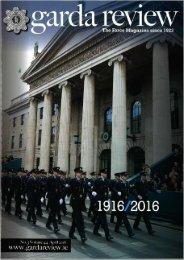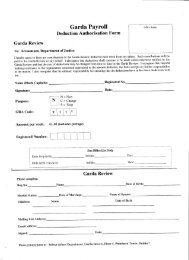Conference Report 2016
Table of contents contains links on page 5. It can be used to skip through chapters.
Table of contents contains links on page 5. It can be used to skip through chapters.
Create successful ePaper yourself
Turn your PDF publications into a flip-book with our unique Google optimized e-Paper software.
Section 1: Pay and Allowances<br />
WRC and the Labour Court and advises that the<br />
appropriate primary legislation be enacted.<br />
6.27 It is now an affront to any group of workers that<br />
such a basic entitlement is denied. This demand is<br />
discrete from those pertaining to trade union status,<br />
the right to strike or any other consideration to the<br />
Association’s membership’s welfare. The denial to<br />
employees of the State’s all-important security<br />
services of such a basic entitlement is no longer<br />
acceptable.<br />
6.28 There has traditionally been a reluctance to have<br />
Garda bodies engage in the same fora as trade<br />
unions. However, for the first time in its history, the<br />
GRA was recently granted (apparently on a once-off<br />
basis), to be involved directly in negotiations on<br />
members’ pay and conditions of employment. This<br />
welcome precedent proved to be a beneficial<br />
development and to be in the best interests of all<br />
parties to the process.<br />
6.29 The relevance of appropriate fora or independence<br />
of the treatment of such matters also recently<br />
featured under the HRA, wherein one of the key<br />
inducing planks for gardaí was the commitment to<br />
this Review process. However, the Department of<br />
Justice’s endeavours to impose the wholly<br />
inappropriate Garda Síochána Inspectorate as<br />
opposed to an independent chairperson of the<br />
Review came close to sundering the complete<br />
sectoral agreement.<br />
6.30 It is common practice to look to our counterparts in<br />
Great Britain and Northern Ireland when addressing<br />
issues, including police pay. Notably these<br />
counterparts are entitled to directly negotiate their<br />
pay and conditions of service with their employers<br />
in the Home Office, via the Joint Police Negotiating<br />
Board (PNB). Prior to 1919 each police force<br />
determined pay for police officers on a local basis. In<br />
1919 a police strike forced the government of the<br />
day to ban strikes, but in so doing they were also<br />
forced to find a way to determine pay and<br />
conditions that would be acceptable to the police<br />
and the public. Hence, from 1919 to 1980 a Whitley<br />
Council approach was adopted.<br />
6.31 The Whitley or Police Council approach operated for<br />
over 50 years with a number of discrete<br />
independent reviews complementing the Council’s<br />
operations. Following the Police Federation’s<br />
withdrawal from the Council (alongside a dispute<br />
over police pay in 1976-77) an Inquiry into the<br />
industrial relations or police negotiating machinery<br />
was established in 1978.<br />
6.32 This recommended the establishment of the PNB in<br />
its present form, with a chairperson and deputy<br />
independent from both sides. The role of the chair<br />
was to “provide continuity and to supply a neutral<br />
voice in negotiation”. An independent secretariat<br />
was also introduced to provide knowledge and<br />
expertise. Specifically addressing the relationship<br />
between the machinery of negotiation and the<br />
absence of the right to strike this (Edmund-Davies)<br />
Inquiry pointed out that:<br />
“Such an important limitation on the freedom of<br />
action of members of the police force renders it<br />
even more essential that the machinery for<br />
determining police pay and other conditions of<br />
service commands the confidence of all sections of<br />
the service.”<br />
6.33 The Police Negotiating Board Act 1980 formally<br />
established the PNB, and was subsequently<br />
consolidated via the Police Act 1996. At the heart of<br />
the Inquiry was the proposed indexing of police<br />
officers’ pay to movements in the Average Earnings<br />
Index for the whole economy.<br />
6.34 In 1993 a further significant development arose<br />
when the Sheehy Inquiry (into Police<br />
Responsibilities and Rewards) recommended a link<br />
to pay settlements rather than average earnings.<br />
Subsequently, the median of total pay settlements<br />
was used to determine the annual police pay rise.<br />
6.35 In 2007-8 there was an unusually vocal and<br />
demonstrative response by the Police Federation of<br />
England and Wales (PFEW) to the decision by the<br />
then Home Secretary to phase in the recommended<br />
pay increases. An estimated 22,500 police officers<br />
marched in central London in protest in an era of<br />
considerable friction between Government and the<br />
PFEW. In August 2008 the Federation was obliged to<br />
call on its 140,000 members to adopt a de facto<br />
‘work-to-rule’ after talks broke down in a bitter pay<br />
row, in response to the Government’s argument<br />
that the automatic indexed pay award system<br />
removed incentives for workplace reform.<br />
6.36 In an attempt to address the issue of police pay<br />
determination in 2010 the government<br />
commissioned the Winsor <strong>Report</strong>. This endorsed the<br />
operation of an independent Police Pay Review<br />
Body to replace the PNB According to Winsor’s<br />
assessment, the experience from other parts of the<br />
British public sector had shown that a pay review<br />
body is capable of respecting the unique status of<br />
certain employee groups in a society that denies<br />
them a right to strike (such as the Armed Forces’<br />
Pay Review Body).<br />
38th Annual Delegate <strong>Conference</strong><br />
43




